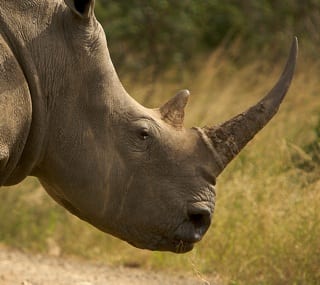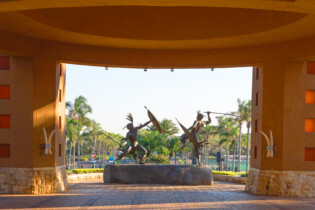Mpumalanga’s award-winning Lion Sands Game Lodge has donated R205,000 to the Private Rhino Owners Association (PROA), helping to fund its campaign to legalise the international trade in rhino horn.
Pelham Jones, chairman of PROA which represents the majority of private owners of some 5000 rhino, 27% of the national population, called the donation “an important intervention against the threatened rhino in South Africa.”
In effect, he said, it hangs a flag on a pole for the PROA’s drive to legalise the international demand for rhino horn and collapse the illegal trade of the so-called ‘blood horn’ trade.
The use of ground-up rhino horn as traditional medicine in Asia, especially in Vietnam and China, has increased to the level where the keratin is expected to be worth more than gold. The weight of a full-grown adult horn can reach 6-8 kgs. In response to this demand rhino poachers and their agents in South Africa and neighbouring countries are now slaughtering adult and young animals at a rate which for the first time this year may exceed their natural population growth.
This year, with the rhino death count already in excess of 500, they are working with the Department of Environment Affairs on a last-ditch strategy which Jones agreed is “highly controversial”.
“It is time to add to our fight for the survival of the estimated 20 000 rhino we have left,” he said. “Joining the international commercial trade in rhino horn is highly controversial. It is polarising the conservation community. As PROA our position at CITES 2016 will support sustainable utilisation and legalising the trade of rhino horn from authorised stockpiles and from normal mortalities.
“This aims to control the amount going into the international market each year and consumer education reducing demand for the horn. It’s not a debate about the morality of the trade or the efficacy of the product as a medicine. We don’t want to join the rhino horn business; our agenda is to save the rhinos’ lives.”
This recommendation was part of a Department of Environmental Affairs’ Rhino Issue Management (RIM) report last month (July 2013) which was approved by Cabinet for South Africa’s rhino trade proposal to CITES 2016.
Jones likens it to the procedure by which the influx of blood diamonds from war zones in West Africa were policed in the world market.
“The horns we sell will be certified through DNA and legalised for sale. By ensuring the origin of the product that we sell we will be ensuring against the ‘blood horns’ of the poachers’ trade flooding the market. This is not a plan to benefit anyone’s personal financial interest. The 5000 rhino on PROA’s game reserves and farms are valued at R1bn but in terms of South Africa’s future wildlife legacy they are priceless.”
Robert More, whose Lion Sands Reserve shares a boundary with the Kruger National Park in Sabi Sand Wildtuin, has although to date been untouched by this horrendous slaughter, are wanting to engage before it is too late.
“Despite the support from government, corporates and private persons which is being channelled into the anti-poaching campaigns, the number of fatalities continues to grow exponentially,” he said. “We are losing the battle against poaching on the ground. We are putting the lives of our own rangers, conservationists and ecologists at risk who are in effect waging what is a narcotics war”.
“In such a war the illegal trade can outpower you with its financial resources on the ground. Our next step therefore must be to change the law.”

Robert More, CEO of Lion Sands/MORE and Pelham Jones, Chairman of the Private Rhino Owners Association. Photo: Thys Dullaart
Jones cites conservationist Dr Ian Player’s Operation Rhino in the 1970s as the way forward for South Africa, once today’s horn trade has been regulated. “The white rhino population was reduced to 300 before Dr Player’s campaign of relocation and anti-poaching operations restored it to nearly 20,000. There were 23 African countries that didn’t follow the Op Rhino lead and their herds of the animals were decimated to the point of extinction. Rhino populations across most of Africa have disappeared in a similar manner.”
The Lion Sands donation is made in the name of Robert More’s brother Nicholas, the CEO of Lion Sands who died in a helicopter accident near Nelspruit in April this year.
“My brother was very much involved in funding the first Lion Sands donation in support of anti-poaching measures last October,” said Robert More. “Nick was the lead conservationist in our family and now I am taking over the baton.”





